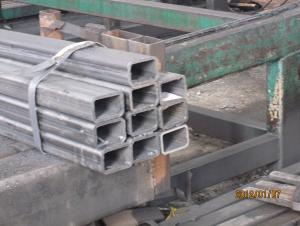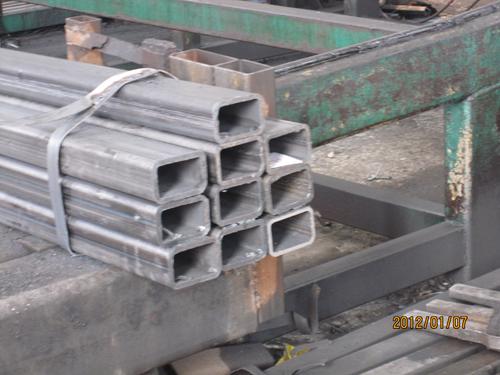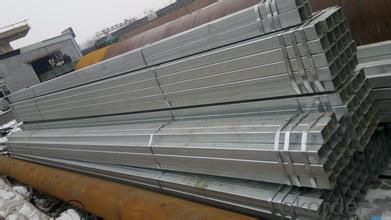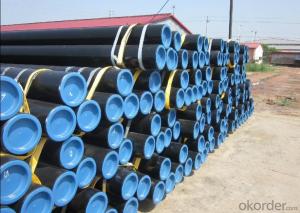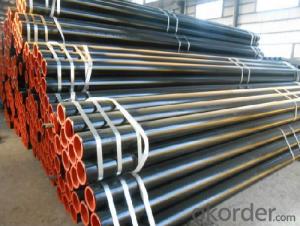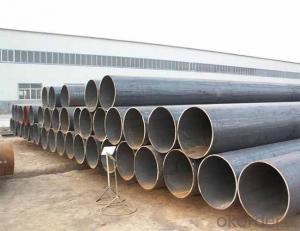steel pipe
- Loading Port:
- China Main Port
- Payment Terms:
- TT or LC
- Min Order Qty:
- -
- Supply Capability:
- -
OKorder Service Pledge
OKorder Financial Service
You Might Also Like
Packaging & Delivery
| Packaging Detail: | 1. In bundles by containers or in bulk 2. Oiled in bundles In bundles by containers or in bulk 3. Oiled with plastic sheet wrapped |
| Delivery Detail: | 10-30days |
Specifications
MS Square Pipe
1)Length:2-12Meter
2)Size:15*15mm-1000*1000mm
3)Wall thickness:0.8mm to12mm
Place or Origin: Tianjin China
FAQ of Steel Pipe
1)How is the quality of your products?
Our products are manufactured strictly according to national and internaional standard, and we take a test
on every pipe before delivered out. If you want see our quality certifications and all kinds of testing report, please just ask us for it.
Guaranteed: If products’ quality don’t accord to discription as we give or the promise before you place order, we promise 100% refund.
2)How about price?
Yes, we are factory and be able to give you lowest price below market one, and we have a policy that “ for saving time and absolutely honest business attitude, we quote as lowest as possible for any customer, and discount can be given according to quantity”,if you like bargain and factory price is not low enough as you think, just don’t waste your time.Please trust the quotation we would give you, it is professional one.
3)Why should you chose us?
Chose happens because of quality, then price, We can give you both.Additionally, we can also offer professional products inquiry, products knowledge train(for agents), smooth goods delivery, exellent customer solution proposals.Our service formula: good quality+good price+good service=customer’s trust
SGS test is available, customer inspection before shipping is welcome, third party inspection is no problem.
Any question, pls feel free to contact us !
- Q: How do steel pipes handle chemical exposure?
- Steel pipes are generally known for their excellent resistance to chemical exposure. The high strength and durability of steel make it a reliable material for handling various chemicals. Steel pipes can withstand exposure to a wide range of corrosive substances such as acids, alkalis, solvents, and gases without experiencing significant degradation or damage. One of the main reasons steel pipes handle chemical exposure well is due to their inherent corrosion resistance. Steel is naturally resistant to corrosion and can form a protective oxide layer on its surface, which acts as a barrier against chemical attack. Additionally, steel pipes can be coated or lined with corrosion-resistant materials such as epoxy, polyethylene, or cement to provide extra protection against aggressive chemicals. Moreover, steel pipes are commonly used in industrial applications where they come into contact with different types of chemicals. They are extensively used in chemical plants, refineries, water treatment facilities, and other industries where chemical transportation or storage is required. Steel pipes can handle the high pressures and temperatures associated with these processes while maintaining their structural integrity and chemical resistance. However, it is important to note that the resistance of steel pipes to chemical exposure can vary depending on the specific type and concentration of the chemical. Some highly corrosive substances may require additional measures such as specialized coatings or alloys to ensure long-term protection. In summary, steel pipes are generally well-suited for handling chemical exposure due to their inherent corrosion resistance, durability, and versatility. Their ability to withstand a wide range of corrosive substances makes them a reliable choice for various industrial applications involving chemical transportation and storage.
- Q: What are the common fittings and accessories used with steel pipes?
- There are several common fittings and accessories used with steel pipes in various applications. These fittings and accessories are essential for connecting, redirecting, controlling, and supporting the flow of fluids or gases through the pipe system. One of the most commonly used fittings is the steel pipe elbow, which allows for a change in direction of the pipe. Elbows are available in different angles, such as 45 degrees or 90 degrees, to accommodate specific piping needs. They are used to prevent sharp bends that could cause flow restrictions or pressure drops. Another common fitting is the steel pipe tee, which has three openings in the shape of a "T". Tees are used to create branch connections to redirect the flow of fluids or gases into multiple directions simultaneously. Steel pipe reducers are fittings used to connect pipes of different sizes. They come in two types, concentric reducers and eccentric reducers. Concentric reducers have a symmetrical design and allow for a smooth transition between pipes of different diameters. Eccentric reducers, on the other hand, have an offset design and are used when there is a need to align pipes at different levels. Couplings are fittings used to join two pipes together. They come in different types, such as threaded or socket weld couplings, and provide a secure and leak-proof connection between pipes. Flanges are another common accessory used with steel pipes. They are flat, round plates with holes in the center that allow for the connection of pipes, valves, or other equipment. Flanges are typically used in applications that require easy access for inspection, cleaning, or maintenance. Other common fittings and accessories include steel pipe caps, which are used to seal the ends of pipes, and steel pipe nipples, which are short lengths of pipe used to extend or connect two fittings. It is important to note that the selection of fittings and accessories for steel pipes depends on the specific application, such as the type of fluid or gas being transported, the pressure and temperature requirements, and the overall system design. Consulting with a professional or referring to industry standards is recommended to ensure the correct fittings and accessories are chosen for a particular steel pipe system.
- Q: What are the different methods of joining steel pipes for steam applications?
- There are several methods of joining steel pipes for steam applications, including threading, welding, and using mechanical couplings. Threading involves screwing the pipes together using male and female threads, which provides a secure connection. Welding involves fusing the ends of the pipes together using heat, creating a strong and permanent bond. Mechanical couplings use a mechanical device to join the pipes, such as a clamp or compression fitting, which allows for easy disassembly and reassembly if needed. Each method has its advantages and is chosen based on the specific requirements of the steam application.
- Q: Are steel pipes suitable for HVAC systems?
- Indeed, steel pipes prove to be a suitable option for HVAC systems. HVAC applications widely favor steel pipes due to their numerous advantages. Initially, their robustness and durability enable them to endure the high pressure and temperature requirements commonly associated with HVAC systems. Furthermore, steel pipes exhibit exceptional resistance to corrosion, rendering them suitable for both indoor and outdoor installations. Moreover, their extended lifespan significantly reduces the need for frequent replacements or repairs. Additionally, the availability of steel pipes in various sizes and thicknesses facilitates effortless customization and installation. Lastly, steel pipes offer a cost-effective solution for HVAC systems compared to alternative materials, making them a financially efficient choice. In conclusion, steel pipes emerge as a reliable and appropriate selection for HVAC systems due to their strength, durability, corrosion resistance, availability, and cost-effectiveness.
- Q: Is there a weld on the outer wall of seamless steel tube?
- As you have said this, you have to fake goods is seamless, commonly known as to seamless steel pipe, seamless steel pipe is welded pipe weld reinforcement, and then go inside and outside the weld is worn away, and then burn side is that you say is that, after you can see the wall friction of a weld, is not too obvious. Like a polished, but no wall bulge, can not see the seam,
- Q: What is the role of steel pipe manufacturers in sustainable development?
- The role of steel pipe manufacturers in sustainable development is crucial as they play a significant part in promoting environmentally-friendly practices. Steel is a highly recyclable material, and manufacturers can contribute to sustainable development by using recycled steel to produce pipes. Additionally, they can implement energy-efficient production processes, reduce waste generation, and adopt responsible sourcing practices. By prioritizing sustainability, steel pipe manufacturers can minimize their environmental impact and contribute to the overall goal of achieving a more sustainable future.
- Q: How do you prevent steel pipes from freezing in cold climates?
- One way to prevent steel pipes from freezing in cold climates is by insulating them with materials such as foam insulation or heat tape. This helps to maintain the temperature of the pipes and prevents them from freezing. Additionally, ensuring that all cracks or openings in the walls or foundation where the pipes are located are sealed can also help in preventing the pipes from freezing.
- Q: Can steel pipes be used for underground chemical injection?
- Underground chemical injection can utilize steel pipes. These pipes are widely employed across industries due to their durability, strength, and resistance to corrosion. For underground chemical injection purposes, steel pipes bring various advantages. They can endure high pressure and temperature, making them suitable for the transportation and injection of chemicals into the ground. Furthermore, steel pipes exhibit superb chemical resistance, guaranteeing that they will not interact with the injected chemicals and compromise the system's integrity. Nevertheless, it is crucial to select the appropriate grade of steel pipe that is compatible with the specific chemicals being injected to ensure optimal performance and longevity. Regular maintenance and inspections are also necessary to identify any potential corrosion or damage to the pipes, thus ensuring the safe and efficient operation of the chemical injection system.
- Q: Are steel pipes suitable for transporting chemicals?
- Yes, steel pipes are suitable for transporting chemicals. Steel pipes have excellent strength and durability, making them capable of handling various corrosive chemicals and maintaining their structural integrity. Additionally, steel pipes can withstand high pressure and temperature, making them a reliable choice for chemical transportation.
- Q: What are the different methods of wrapping steel pipes for corrosion protection?
- Corrosion protection for steel pipes can be achieved through various methods, tailored to specific applications and environmental conditions. Some commonly used techniques include: 1. Tape Wrapping: Steel pipes are wrapped with corrosion-resistant tape, like polyethylene or polypropylene tape, to create a barrier between the pipe and corrosive elements. This reduces the risk of direct contact and subsequent corrosion. 2. Inner Wrapping: A protective coating or lining is applied to the inside surface of the steel pipe. This method is commonly employed for pipes transporting fluids or gases, offering an additional layer of protection against internal corrosion. 3. External Coating: A widely utilized technique involves applying a protective coating to the outer surface of the steel pipe. This coating, which can consist of materials like epoxy, polyethylene, or polyurethane, acts as a barrier against corrosive elements, extending the pipe's lifespan. 4. Cathodic Protection: An electrochemical method is utilized to safeguard steel pipes from corrosion. By connecting the steel pipe to a sacrificial anode, such as zinc or magnesium, the anode corrodes instead of the pipe. This diverts corrosive currents away from the pipe, preventing its corrosion. 5. Heat Shrink Sleeve: Heat shrink sleeves are commonly employed for corrosion protection in underground or submerged scenarios. These sleeves, made of heat-activated material, shrink when heated to form a tight seal around the pipe. By preventing direct contact with moisture and corrosive elements, the sleeve effectively acts as a barrier. 6. Fusion Bonded Epoxy (FBE) Coating: FBE coating entails applying a thermosetting powder coating to the steel pipe's surface, which then fuses to create a protective layer. This coating exhibits strong adhesion and corrosion resistance, making it a popular choice for various steel pipe applications. Choosing the appropriate corrosion protection method for steel pipes depends on factors like the environment, specific corrosive elements, intended use, and other requirements. Seeking professional advice and consultation may be necessary to determine the most suitable technique for a particular situation.
Send your message to us
steel pipe
- Loading Port:
- China Main Port
- Payment Terms:
- TT or LC
- Min Order Qty:
- -
- Supply Capability:
- -
OKorder Service Pledge
OKorder Financial Service
Similar products
Hot products
Hot Searches
Related keywords
